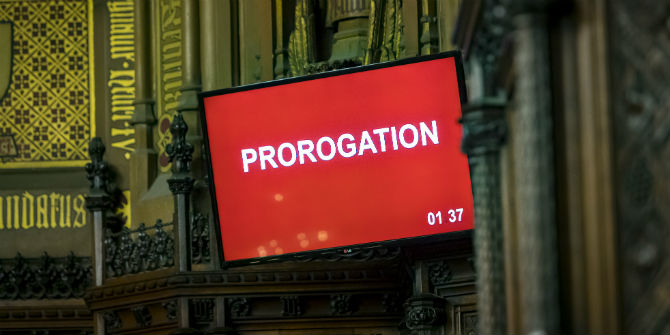 How is the EU going to interpret the British vote to withdraw from the EU? As Tim Oliver explains, the remaining members of the EU now face three challenges: finding a unified initial response, finding a reliable UK government to begin negotiations with, and reflecting on what it means for current ideas of European integration and unity.
How is the EU going to interpret the British vote to withdraw from the EU? As Tim Oliver explains, the remaining members of the EU now face three challenges: finding a unified initial response, finding a reliable UK government to begin negotiations with, and reflecting on what it means for current ideas of European integration and unity.
The vote by the British people to leave the EU makes this morning a sombre one for EU leaders. Despite Britain’s often-difficult relations with the rest of the EU, Britain has been a leading player in European integration and polling tells us the rest of the EU had wanted the UK to stay. But how the rest of the EU view the UK was not a leading issue in the campaign. Instead the campaign generally divided into a remain camp focusing on economics and a leave campaign focusing on immigration. Nevertheless, a multitude of issues were raised ranging from the future of the NHS through to the role of the EU in preventing war in Europe. Interpreting the result will not be an easy task for British politicians, journalists and academia. What will the EU think?
A Quick Collective Response
The first challenge for the EU will be to make clear its collective response. This will largely happen next week when the European Council meets in Brussels. We would expect that the most important message the EU will want to send is one that emphasises its unity. In doing so the EU will note that a Brexit will be balanced against several other challenges facing the Union, namely those in the Eurozone, Schengen and security concerns in Eastern Europe. The rest of the EU is likely to want to make clear that the Union remains committed to solving each of these problems, and not becoming focused solely on the UK.
However, individual governments and leaders will more than likely give their own positions before the EU meets as a group. And before them the financial markets and international media will give the first non-UK reactions. The size of the UK’s financial services industry means that what happens to the City of London is systematically important to the world economy. The rest of the EU will have to decide whether it wishes to push the UK to begin exit negotiations immediately (and thus trigger the article 50 process) or whether it will wait for the UK government to make its position clear. The EU will also have to begin contemplating what sort of new relationship it would like to have with the UK after it leaves the Union. For example, will the EU push for UK membership of the EEA or accept some period of transition towards a free trade deal? While a period of reflection by the EU is to be expected, some member states will want to see movement sooner than others.
While most attention will focus on states such as Germany, all 27 EU member states and the EU’s institutions will now need to think about the potential implications. The BrexitVote blog’s series setting out how the other 27 EU member states might respond to a Brexit shows that reaching agreement amongst them all will not be easy and there is a risk that the EU’s position will reflect a lowest common denominator. It should not be overlooked, however, that the EU’s initial response will speak not only to the British government and people. It will also be heard by the citizens of the EU, and allies and countries around the rest of the world. It will also speak to international and European financial markets, which will be looking for signals as to how the EU will now respond.
An Uncertain UK Negotiating Partner
Finding unity amongst the EU will be made somewhat easier by any difficulties UK government now faces, difficulties that could give the EU a head start in setting out its positions. However, in doing so the EU would need to take into account the volatile nature of UK politics. Nine overlapping negotiations will now be triggered by a vote to leave, and one of them will be over who should now lead the British government. David Cameron may survive as prime minister, but having lost the referendum he will be very weakened.
If Cameron now resigns as Conservative party leader then he will be a caretaker prime minister awaiting the election of a new Conservative leader, something that will take until the autumn. An EU that makes demands of the UK while its government is in a period of flux runs the risk of enflaming the campaigns to succeed David Cameron. The EU may find the UK – and more specifically David Cameron’s successor – becomes more difficult to negotiate with. Should Cameron stay on then it may be that the EU finds itself negotiating with a team led by prominent leave campaigners, with Cameron in no real position to influence negotiations. In the long-run there are doubts as to whether the UK government could get any deal with the EU through the House of Commons.
Leaning Lessons
The most difficult task of all will be the question of what overall message about European integration and membership the rest of the EU now take from a British leave vote. While the EU will need to reflect on what the result means, initial responses always shape the narratives that inevitably develop.
If the rest of the EU focus on David Cameron and divisions within the Conservative Party as the cause of the leave vote then it risks simplifying a more complex set of factors that led to the leave victory. The leave vote has won in no small part by focusing on issues such as immigration, sovereignty and identity. This means a large number of Britons put economic concerns second. The EU could have to accept that the British people have accepted any economic costs that will follow withdrawal from the single market, something that will also cost the EU given the trade deficit the UK runs with the rest of the EU. The EU may have to resign itself to an economically painful UK exit.
The EU also needs to reflect on the extent to which the opinion of British citizens reflects wider unease across the EU. As recent surveys showed, the EU has seen a widespread decline in support. Whether a vote for Brexit is the beginning of the end of the EU is open to much debate. Nevertheless, the rest of the EU should not dismiss the British vote as an anomaly to be dealt with in isolation from the other problems the Union faces. It has so far managed to muddle through in the face of a series of crises. Should Brexit align with one or more of them then the EU may face its biggest test.
This post represents the views of the authors and not those of BrexitVote, nor the LSE. Image: CC0 Public Domain
Dr Tim Oliver is a Dahrendorf Postdoctoral Fellow on Europe-North American relations at LSE IDEAS







Your most important point is the ever present question as to whether this [Brexit] is the beginning of the end of the EU however remote a possibility.
This in turn must force the government of France to consider a fall-back position that includes an accord with the UK.
France fears being isolated.
France cannot afford to annoy the UK regardless of the “there will be consequences” remark of Hollande.